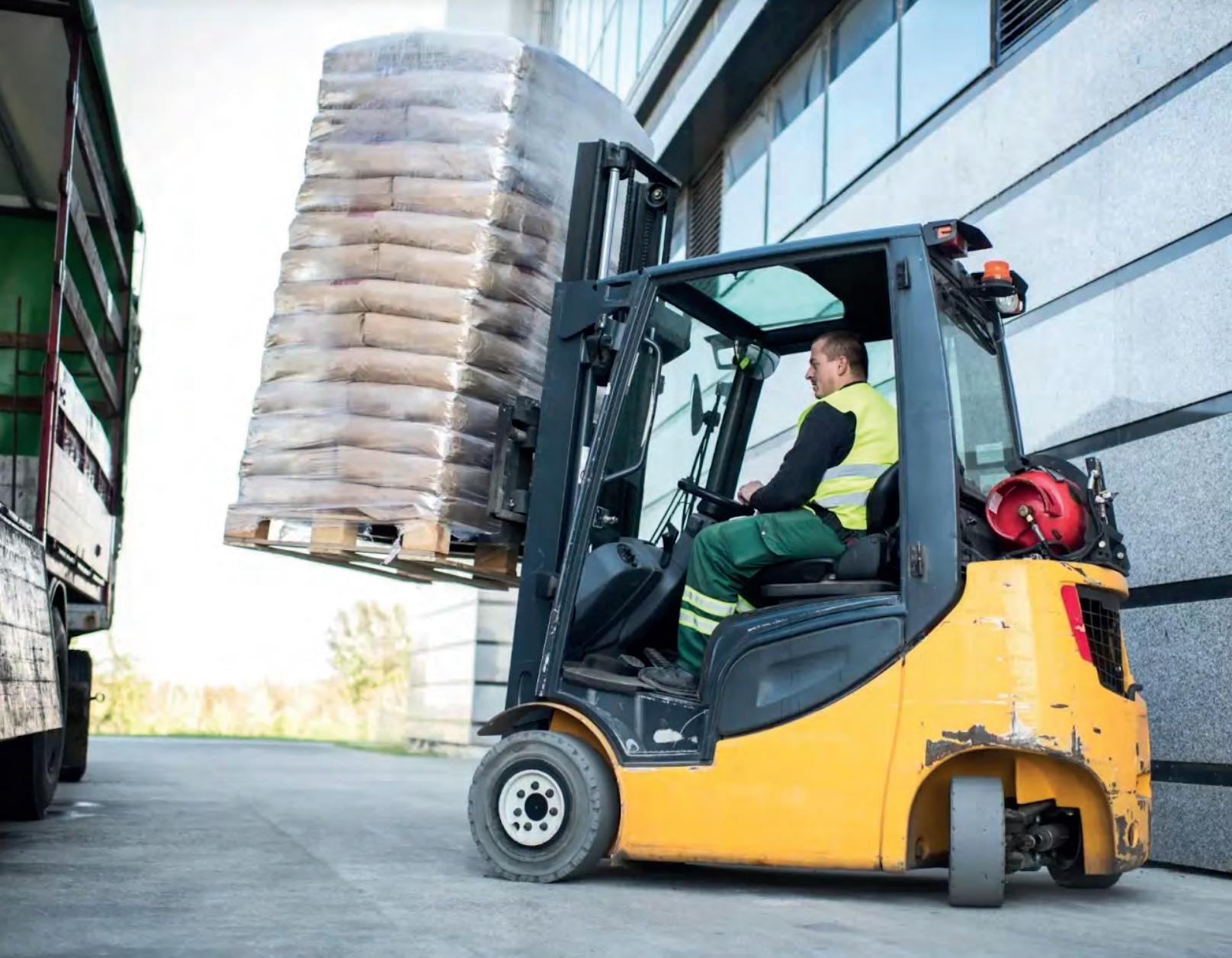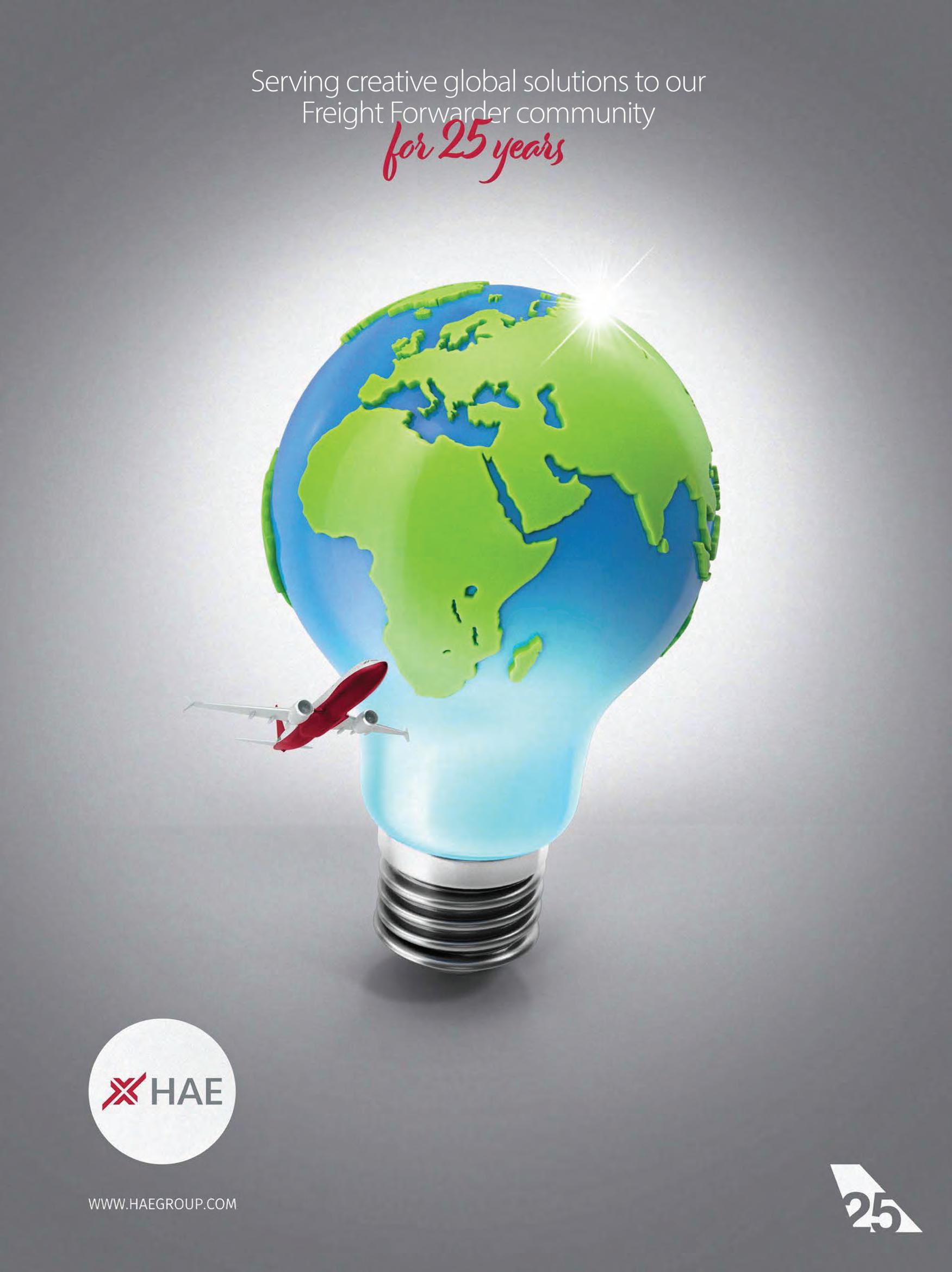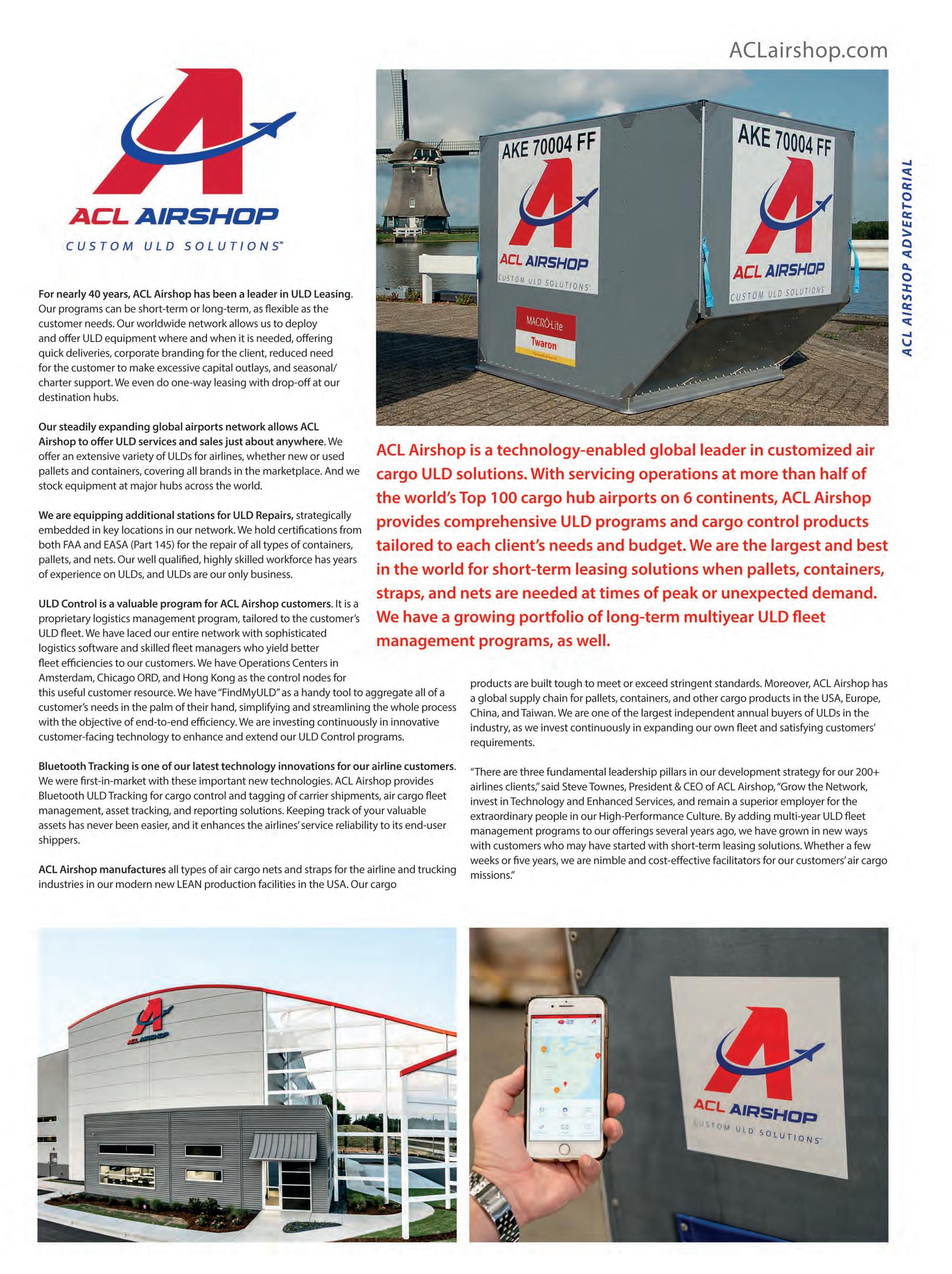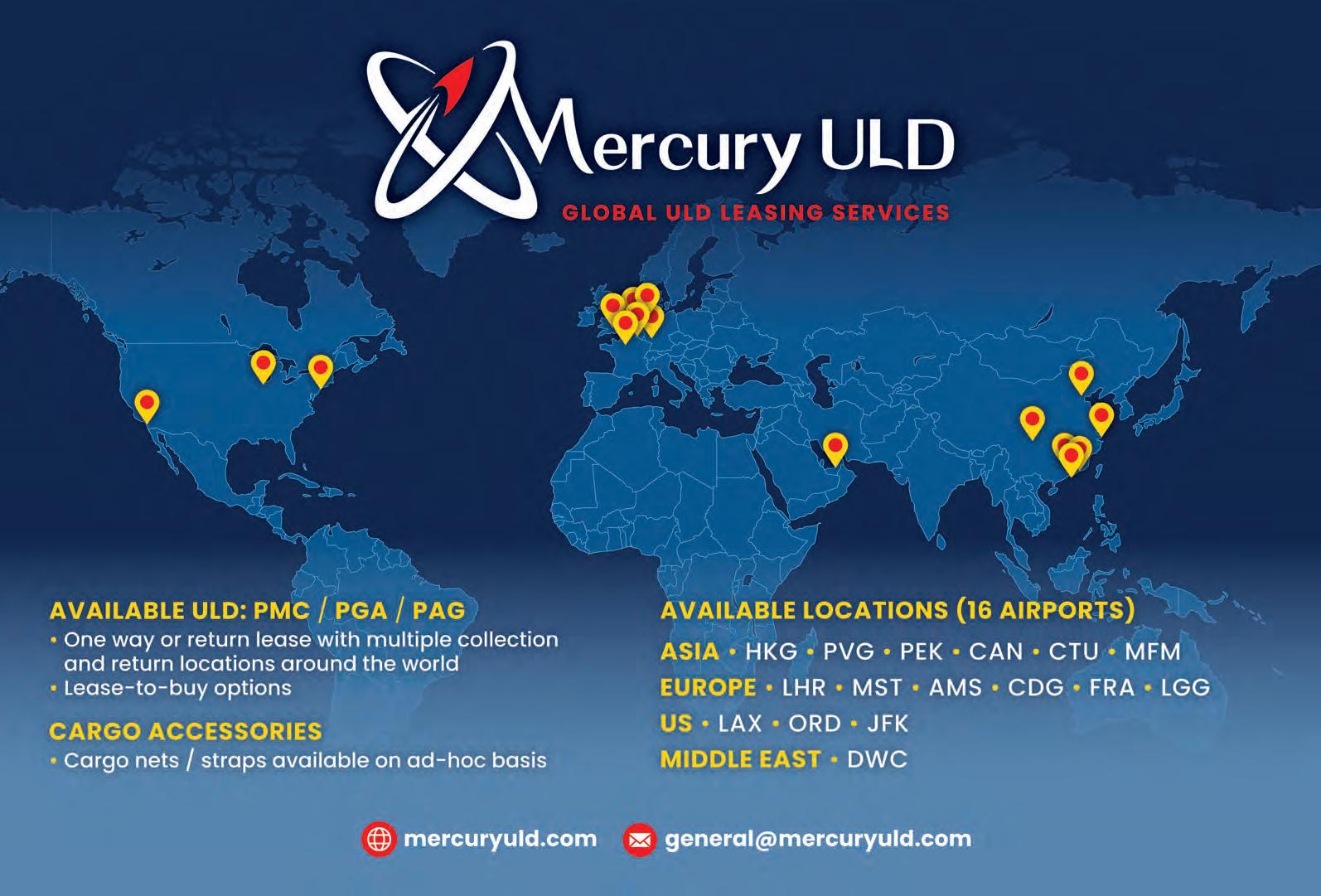ACW Freight Fo rwarders Supplement is sponsored by



ACW Freight Fo rwarders Supplement is sponsored by





Few working in the airfreight industry will not have come across ei ther a freight forwarder or the name of one of the headline forwarder operations. They can be a ‘mom and pop’ one person operation, a man with a van, or a multinational business with facilities across time zones and continents.
At the simplest, freight forwarders oversee the worldwide movement of cargo, packing, documentation and customs clearance, on behalf of importers and exporters. Most significant freight forwarders have become Authorised Economic Operators (AEO), which enables them to take advantage of simplified customs clearance, especially de ferred payment of import duties and charges which might otherwise need to be paid before goods are released. It is rare for a forwarder to concentrate solely on air shipments. Most will also look to send clients’ cargoes by rail, road or ocean modes or any combination of these modes where appropriate.
The freight forwarding industry can be broken down into a range of services: packaging, documentation; transportation and ware housing; and, VAS (Value-added services). VAS can include advice on optimising transport costs: freight charges, special documentation costs, customs clearance expenses, customs duty; cargo insurance: advantageous conditions at competitive premiums; and, advice for proper packaging, labelling, loading and stowage of merchandise.
The global freight forwarding market size was considered about $186 billion in 2021, marking a CAGR (Compound annual growth rate) of 3.3% in the forecast years until 2028.
Freight forwarders can use trusted contacts with carriers and part ners in order to negotiate the best possible price. This may be using established commercial routes with regular frequent departures, or by charter, valuing different offers and choosing the better route that optimises speed, costs and reliability, considering all the variables necessary for the analysis of each case.
One of the key growth drivers in the freight forwarding market is the increase in international trade volumes. The growing number
of trade agreements, particularly among rising nations, is influenc ing international trade. Furthermore, the rising e-commerce sector has aided in the expansion of trade activities, resulting in increased freight forwarding market growth.
The ease of doing business in today’s world has been greatly in fluenced by an emerging array of multilateral preferential trading agreements such as the North American Free Trade Agreement (NAFTA), the Latin American Free Trade Association (LAFTA), the Association of Southeast Asian Nations Free Trade Area (AFTA), and many others. This factor is projected to propel the freight forwarding market forward.
Increasing cross-border e-commerce is also expected to drive the growth of the freight forwarding market. For some time, consum er preferences have been migrating away from physical shopping and toward e-commerce, but the COVID-19 pandemic expedited this trend. Third-party logistics providers take over the full supply chain, including services like packaging, documentation, transportation, warehousing and VAS, whereas freight forwarders act as an interme diary, letting enterprises benefit from the best shipping costs from the forwarder’s contacts.
When compared to operating each mode independently, taking in tegrated services offered by freight forwarders improves reliability, flexibility, capacity and safety. Their services are customer-centric and aim to meet the demands of clients as quickly as possible.
The Asia-Pacific freight forwarding market is the fastest expanding, with China accounting for the majority of the market. This is due to the growing logistics in ASEAN countries, as well as the presence of big economies such as China and India. Furthermore, the region’s strong government backing for the logistics sector contributes to the industry’s growth.
Our supplement will look at how some of the most important freight forwarders are returning to air shipments with the opening up of the world economy post-pandemic.
Editor: James Graham Director of Operations: Kim Smith International Sales Director: Rosa Bellanca International Sales Executive: Zainab Khalid Finance Manager: Rachel Burns
Video Director: Michael Sales Design & Production Manager: Alex Brown Website Consultant: Tim Brocklehurst
Directors: Norman Bamford • William Carr • Dawn Jolley
The famous US baseball player Yogi Berra is often quoted as saying: “It’s tough to make predictions, especially about the future.” In 2019, no-one could have foreseen what lay ahead in terms of coronavirus, a war in Europe and a cost of living crisis in many markets around the world.
Brandon Fried, executive director of Washington-based The Airfor warders Association (AfA), was in the same boat as Berra three years ago. He ruefully says: “This decade certainly got off to a very rough start, with the pandemic upsetting every known business model. For tunately, our industry responded quickly and creatively with solutions that likely would not otherwise have been even considered.
“Our industry has shown a remarkable ability to adapt to changing conditions, and will no doubt continue to do that, whatever lies ahead. At this point, the industry still looks solid, but of course, anything can happen, given the uncertainties in the global economy. There is some talk of a global recession, and we have lived through that before and have come out even stronger, even if there may be short-term pain.”
Looking at the general state of US airfreight at the moment, Fried is mildly positive. He says: “Overall, it is pretty solid. We have gotten through some of the toughest times we have ever seen, and I think have become even stronger. Our members have added services and capabilities as they answer the changing demand of our customers.
We may be seeing a slight slowing in the e-commerce sector, but again you have to consider the phenomenal growth that occurred in that segment due to the pandemic. It is hard to sustain that kind of growth in the long term.”
A recent survey of Airforwarders Association members shows that 45% say business is still up a bit over last year and 27% indicate re cord-setting volumes. Still, capacity challenges exist in markets such as the transpacific, where passenger flights have not resumed to pre-pandemic levels.
Fried says: “We’re seeing a slight reduction in demand prediction as FedEx and UPS cut back in some areas and reduced the number of aircraft operations. However, it remains to be seen what this holiday season will look like. So far, consumer spending seems to hold fairly robust levels, despite inflation, as wages also remain strong, and un employment remains near record lows.”
“The business of America is business!” This often repeated phrase was reported to have first been said by President Calvin Coolidge, in a Jan uary 1925 speech to newspaper editors. A cornerstone to this is US export activity. Again, here Fried is quietly optimistic.
He says: “It has remained strong as we have recovered from the pan demic. We may be starting to see a little impact on export volumes due primarily to the dollar’s current strength in global markets. If that trend continues we may see more of a normalising in freight flows.”
Are there any shadows on the horizon for AfA members?
Freid considers: “I don’t see anything in the US that is significantly different than what we see globally. With the uncertainty in global markets and talk of a possible recession, the US would not be exempt from the effects of that. Of course, we remain concerned about the war in Ukraine and its potentially adverse impact on global freight markets.
“There’s no doubt that the big, international forwarders, based here in the US or elsewhere, capture much of the spotlight. But remember that thousands of smaller, niche players in single or multiple markets still capture an impressive amount of business. And they wouldn’t still be around if they did not embrace change, technology, and other issues impacting our industry. Airforwarders Association members succeed because they answer a market need for unique and creative logistical solutions well-tailored to their customers. I don’t see that changing any time soon.”
There is M&A activity in the US airfreight forwarder sector at the mo ment being observed by Fried: “The AfA has seen a few in the past several years as companies look to either expand their footprint or add services by acquisition rather than organically. That will likely con tinue, but I don’t see an overwhelming push to do that widely.”

Fried concludes his thoughts for Air Cargo Week with an overview on prospects for AfA members.
He says: “We keep a close eye on regulatory issues in the US and glob ally. Make no mistake that our industry takes the need for security seriously. Still, at the same time, it is hard to provide the services and solutions our customers need when we have to deal with regulations that can sometimes be conflicting or confusing.
“We must continue to work closely with global regulators and legis lators, including the TSA here in the US, to ensure that we attain the common goal of providing the highest level of security without re stricting the flow of legitimate commerce.”
“Our industry has shown a remarkable ability to adapt to changing conditions, and will no doubt continue to do that, whatever lies ahead”


CargoAi, airfreight’s fastest growing digital enabler, and Chain.io, the leading cloud-based integration platform that connects partners across the global supply chain, have developed a strategic technology partnership that will “supercharge” the freight forwarder experience.
The partnership will allow most large and medium-sized freight for warders on Chain.io’s network to easily connect to CargoAi’s platform to make instant bookings to the GSAs and airlines, while remaining on their own transportation management system (TMS).
“These functionalities were requested by most of our existing users.
We are delighted to solidify this strategic partnership with Chain.io to enable new efficiency gains and drastically improve the visibility of our airline partners around the world” says Matt Petot, founder and CEO of CargoAi.
The CargoAi platform provides a simple end-to-end interface for
freight forwarders to make quotes, schedules, bookings, shipments, tracking and purchase orders, as well as reporting capabilities. With the addition of Chain.io, users can now complete the same experi ence within their TMS system, without navigating between multiple airline websites or making different phone calls.
“Our partnership with CargoAi extends the powerful network we offer to freight forwarders,” said Brian Glick, founder and CEO of Chain. io. “Technology is more impactful when it doesn’t live in silos, so the ability to make instant bookings with CargoAi and get air visibility from within a TMS will give forwarders more efficiency and flexibility.”
The partnership will commence with Rates, Capacity, eBooking and Tracking information as well as CO2 calculation, bringing modern ca pabilities to the TMS, and enabling airlines and GSAs who are live on CargoAi to be directly accessible and visible.

Three headline forwarders with multi-million dollar turnovers have re ported to shareholders and the wider financial markets on Q3 2022 results that show strong performance by freight forwarders in the quarter. They also give a picture of the financial performance of the sector at the moment. With offices in more than 80 countries and an international network of partners and agents, Copenhagen-based DSV is reporting a “strong Q3 performance amidst macroeconomic slowdown.” The forwarder reports strong results driven by good per formance across divisions, with growth in earnings and market share gains across most business areas. In the first nine months of the year, gross profit grew by 50%, while earnings before interest and taxes (EBIT) before special items grew 75% and adjusted free cash flow more than quadrupled compared to the same period last year.
One driver of this performance was the integration of Agility which is now successfully completed. The Q3 results are the first interim fi nancial results to overlap with the integration, which commenced on 16 August 2021.
“The global economic uncertainty has increased, but DSV’s flexible business model enables the company to quickly adapt to changes,” says the forwarder.
DSV has upgraded the full-year outlook range for 2022. EBIT before special items is expected to be in the range of DKK 24,500-25,500 mil lion (previously DKK 23,000-25,000 million).
In the third quarter of 2022, the Kuehne+Nagel Group continued to perform well in the market. From January to September 2022, net turn over increased by 40% to CHF 30.6 billion, EBIT by 71% to CHF 3.1 billion and net earnings by 73% to CHF 2.3 billion. Free cash flow amounted to CHF 2.6 billion. The Group’s conversion rate amounted to 36.2%.
Stefan Paul, CEO of Kuehne+Nagel International AG said: “Kueh ne+Nagel posted its best-ever nine-months results. However, higher energy prices, broad-based inflation as well as geopolitical tensions drive additional volatility in supply chains. At the same time, the easing in sea and air freight markets translates to some relief for our customers. Our asset-light business model is primarily focused upon responding to our customers’ worldwide needs in a flexible manner while ensuring a high quality of service.”
Net turnover in the Air Logistics business unit amounted to CHF 9.1 billion and EBIT was CHF 1.1 billion for the period January to Septem ber 2022. The conversion rate reached 49.5%. Airfreight volumes were 1.7 million tonnes through the end of September 2022. Air Logistics also maintained relatively high average yields in the third quarter of 2022, marking a significant increase on the prior year’s level.
Commercial airline operations were volatile in the first nine months of 2022 due to the overall geopolitical situation and level of uncer tainty. Even so, demand for cargo capacity on most trade routes was positive.
Kuehne+Nagel Air Logistics further expanded its healthcare logistics footprint in the third quarter of 2022. With MedConnex, the business unit launched regular charter flights, such as vaccines, from the phar ma hub in Belgium to the Americas, Asia and Africa.
DHL owner Deutsche Post saw earnings increase in Q3 and will raise 2022 EBIT guidance as a result having assessed the preliminary group results for the month of September and hence Q3 2022 as well as the outlook for the remainder of the year.
Despite the increasing macroeconomic uncertainties, the group has recorded a good business development in the third quarter of this year. Against the background of a meanwhile well-advanced e-com merce normalisation, the year-on-year comparison of B2C volumes has improved in Q3 from the more pronounced decline observed in the first half year. B2B volumes reflect a softer demand in line with the general economic development; nevertheless, it was able to maintain good utilisation levels across all network activities. The capacity situa tion in ocean and airfreight markets has meanwhile eased, so that the expected normalisation is now also in progress here, which is accord ingly reflected in weakening market rates.
Preliminary group EBIT reached around €2.040 billion in Q3 2022 (Q3 2021: €1.771 billion).
The divisional results in Q3 in detail: EBIT in the Express division reached around €1,010 million in the third quarter of 2022 compared to previous year’s Q3 of €971 million; EBIT in Global Forwarding, Freight stood at around €585 million in Q3 2022, once more clearly ahead of previous year’s Q3 of €372 million. EBIT at Supply Chain came in at around €220 million in Q3 2022, also well above last year’s Q3 result which stood at €142 million.
Also, eCommerce Solutions recorded Q3 2022 EBIT of around €85 million. It was at €91 million in Q3 2021. EBIT in Post & Parcel Germany in Q3 2022 was around €285 million (Q3 2021: €300 million).
The good earnings development is also again reflected in a strong cash flow generation: free cash flow in Q3 2022 amounted to more than €1.5 billion (Q3 2021: €1.257 billion).
Based on these preliminary Q3 results, the group EBIT for the first nine months of this year reached around €6.5 billion. Therefore, 2022 EBIT guidance (currently: €8.0bn +/-5%) will be revised upwards with the formal release of full Q3 2022 earnings on November 8, 2022.

“The global economic uncertainty has increased, but DSV’s flexible business model enables the company to quickly adapt to changes”


The 59th FIATA (International Federation of Freight Forwarders Asso ciations) World Congress 2022 in Busan, Republic of Korea was held last month after it had been delayed by two years because of the pandemic. The event marked a huge achievement in the next FIATA chapter after the Reset programme initiated in 2019 shortly after the FIATA World Congress in Cape Town. In this programme, FIATA made the most significant achievement of its history with the roll-out of the paperless FIATA Bill of Lading.
As Korea is the largest user of the FIATA Bill of Lading (FBL), and FIATA is leading the way in the sector digitally, Korea is evidently well on board with the ambition of the Reset programme. The mutual connection of the two made this year’s World Congress all the more important, says the Swiss-based association. A press conference in Busan noted the importance of FIATA in policy development and the furthering of the digital field within the sector. In a second congress press conference, FIATA also announced that a total of 15 software providers had now been onboarded with FIATA for the implemen tation process of the eFBL, with eight national associations having signed the Distribution Agreement to allow members to start using the eFBL.
Following the launch, FIATA made significant steps forward, hav ing been approached by a major international bank, Arab Bank (Switzerland), who will work with FIATA on the future of trade flows, proving the interoperability of the eFBL, using blockchain technology to unleash global connectivity between freight-forwarders, logistics providers, software companies and financial institutions. Arab Bank, together with FIATA, CargoX and edoxOnline have launched a Proof of Concept which will test the transfer of an eFBL between two cus tomers of the bank, using different eFBL platforms, with the Bank as an intermediary, providing a secure environment to transfer the doc ument together with the title of the goods. The eFBL, represented as an NFT (non-fungible token) will be transferred from the eWal let of the seller to the eWallet of the buyer, triggering the payment automatically.
This is a first, but major, step in a series of efforts needed to create the ecosystem that will enable a fully digital supply chain. The final phase of the Proof of Concept, with a full test transaction, is planned to take place in mid-October.
The Congress has also been an opportunity to reaffirm, consolidate and strengthen its mandate to the FIATA HQ’s advocacy efforts calling for a level playing field and to reform and ensure regulatory coher ence to address the maritime crisis. A resolution seeks reforms that provide regulatory clarity on antitrust laws governing the shipping in
dustry. Regulators globally need to monitor the extent of data sharing and co-ordinated activity in alliances and consortia and ensure they are confined to port-to-port activities, so that competition arrange ments for vertically integrated carriers do not pervade sectors where they are not intended to apply.
This year’s Congress also marked the announcement of the 2022 Young Logistics Professional Award Regional winners, with an award ceremony taking place at the closing ceremony. On the final night, FIATA and TT Club announced that Karina Perez Perez, the winner of Region Americas, representing the Canadian International Freight Forwarders Association, CIFFA, has been awarded the title of Young Logistics Professional of 2022.
“TT Club is inordinately proud of sponsoring this award since it was established as the Young Freight Forwarder of the Year over twenty years ago. Its importance as an inspiration to our budding profes sionals is even more relevant today as the global logistics industry faces ever growing and varied challenges. So fitting therefore, that the winner, who I heartily congratulate, Karina Perez Perez submitted a dissertation detailing her work in assessing the tools the industry is developing to enhance operator’s performance in the crucial area of sustainability. TT believes that the logistics sector’s ability to attract vital new talent to its ranks is greatly improved by a stronger com mitment to environmental issues that are so concerning to those younger generations around the world,” said Michael Yarwood, TT Club’s managing director, loss prevention.
FIATA and TT Club extend their congratulations to the three other dedicated, ambitious and very impressive young professionals who made it to the final stage of the competition: Regional Asia Pacific Winner, Avishkar Srivastava, Federation of Freight Forwarders’ Associ ations in India (FFFAI), India; Region Africa and Middle East Ruvimbo Gukwe, Shipping and Forwarders Agents Association of Zimbabwe (SFAAZ), Zimbabwe; Region Europe Winner Maximilian Drüschler, Bundesverband Spedition und Logistik (DSLV), Germany (Region Europe Winner). All finalists showed exceptional skill and motivation during the competition, which all resulted in high quality work.
FIATA President, Ivan Petrov shared: “This competition is extreme ly valuable to our field because young people are the future of the industry. They will be the ones to shape the image of the logistics industry, its importance, its worth, its power and the opportunities that come with it. Attracting and promoting young people in the freight forwarding industry is one of the top priorities on FIATA’s agen
Club is inordinately proud of sponsoring this award since it was established as the Young Freight Forwarder of the Year over twenty years ago”
da, and we are honoured to meet young logistics professionals, who we can also learn from, while likewise providing them with important tools and guidance for their careers. FIATA acts as the bridge between successful and recognised freight for warders and young promising talents.”
The industry faces increasing difficulty to find talented and motivated candidates, with work force issues being amongst the top obstacles for logistics companies. The goal of this Award competition is to motivate, inspire and search for high calibre, quality young professionals to be a leading light for others to be inspired by, and to show that excellence brings the career potential of these young people to another level. Candi dates can grow their network, develop new skills, learn more about the sector and what it entails, and gain exposure within the global freight for warding community. FIATA and TT Club strongly encourage young logistics professionals, with the essential support of their FIATA national associa tion, to join this exciting venture.

In a final big announcement of this year’s FIATA World Congress, FIATA is excited to officially inform members that FIATA member Vietnamese Logis tics Association, has won the 2025 bid to host the 2025 FIATA World Congress in Hanoi. FIATA looks forward to working alongside the hosting asso ciation to deliver the 2025 World Congress with success, and in the meantime looks forward to welcoming the global logistics family to Brussels at the 2023 World Congress.




Robert Van de Weg, chief commercial officer of Paris-based ECS Group, is confident that business sentiment at the moment in European airfreight activity and how might it impact on ECS Group has positives and negatives.
He says: “The markets of Netherlands, France, Spain, Italy and Germany but also the Nordics and Eastern European countries are active. The reduced Euro exchange rate will help compet itiveness on exports, but will also affect import potential into Western Europe. At the same time, capacities have increased in particular in the North Atlantic. The continent represents the second largest economy in the world and represents a huge pool of consumer demand. Europe has always been a balanced market in terms of exports and imports making it a stable and profitable environment for airlines.
“Many of the major countries we are present in are some of the world’s largest export economies and we play an import ant role in getting those products to foreign markets. We aim to further strengthen our customer portfolio in Europe, in par ticular in the domain of Total Cargo Management (TCM); we have a strong and capable team managing these activities and besides, we have more flexibility when it comes to hiring staff in comparison to most of the airlines.
With growing levels of inflation, war in Ukraine and a fuel cri sis in many markets, it is undeniable there are many economic headwinds at the moment in many locations, not least ris ing aviation fuel prices. Is ECS Group in a good place to fight against these headwinds?
Van de Weg notes: “Indeed, the environment is getting increasingly challenging. Our answer lies in focusing on ele ments we have influence over, such as adding customers and working with our customers on our value-added services as we do for example in the domain of airmail and charters.
“What is certain is that our customers’ needs have diversi fied. To respond to this, we have also diversified our portfolio of solutions through the creation of a new GSSA approach:
“The Augmented GSSA” strategy. The market has evolved and changes are occurring at a phenomenal rate. We cannot re main a traditional GSA, we have decided to go beyond and we will continue to evolve in particular in the digital domain where we make large investments both leading to innovative solutions as well as efficiencies.”
The ECS Group is putting the recent pandemic past behind it as Van de Weg notes the group will be significantly ahead of 2019 levels, mainly due to its enhanced customer base, additional services as well as a strengthened geographical ‘footprint’, mainly in Asia.
The year started very strong but is ending somewhat sub dued. In his 30 years in air cargo, one lesson Van de Weg has learnt is to ‘expect the unexpected’. Airfreight is going to be the first sector to pick up in case of better economic or geo political developments and in that sense, he is convinced that things will turn for the better again.
He predicts inflation will lead to higher cost levels for airlines and those companies servicing airlines, which will lead to high er break-even points of operations and thus, increasing yields and prices in the sector.
“We are countering these higher cost levels through our strong digitalisation drive and furthermore, we keep looking at increasing our economies of scale,” says van de Weg. “Even though our staff loyalty is strong, we are continuously look ing for new talent in particular in the digital field. The labour market is tight but there is still room to attract these talents as our industry continues to be an attractive one: dynamic and international.
“The key word today is ‘agility’. You have to know how to adapt to the needs of your customers, to understand the prob lems they encounter in order to offer them adapted solutions. But above all, agility allows you to anticipate the unexpected, so to speak. In this sense, agility is also innovation: anticipating the demand and the potential pitfalls of tomorrow. This helps a lot, especially when this agility is applied in parallel with a dig ital transformation that has become a must-have. A dynamic that had appeared before the pandemic, but that the crisis as a catalyst has reinforced.
“This means that we have to think about the GSA business
model in a completely different way. We must be able to offer highly technical skills on all fronts. At ECS Group, we have de veloped ten abilities to achieve this.
“Besides, the Covid period has enhanced the team spirit and the sense of ‘togetherness’ throughout the company.”

ECS Group business in Ukraine is continuing despite the mil itary situation in the country and Van de Weg acknowledges: “Our team in Ukraine was very much affected obviously and we all realise at these moments what the real priorities in life are. Our team continued to be active, even from remote loca tions, and our business there is as strong as ever.
“In any industry the value chain is never optimal and can al ways be improved. However, the air cargo value chain is highly effective and this was again demonstrated during Covid. The improvements lie mainly in the area of digital efficiency to re duce manual operations and in the use of marketplaces like CargoAI.
“At ECS Group, we are prioritising our actions in these two directions.”
“In any industry the value chain is never optimal and can always be improved”
